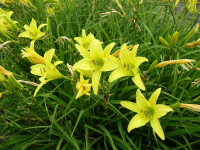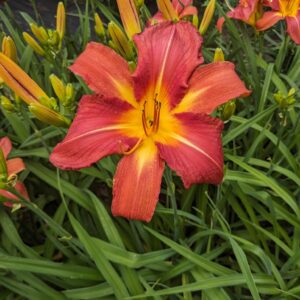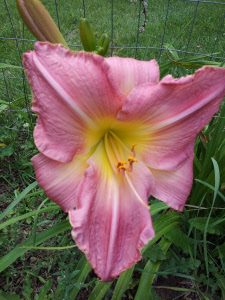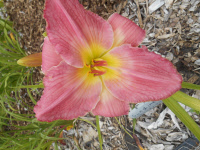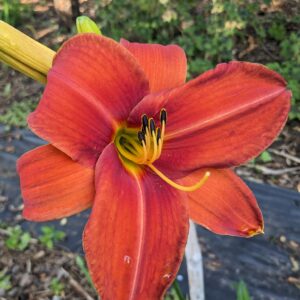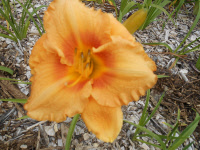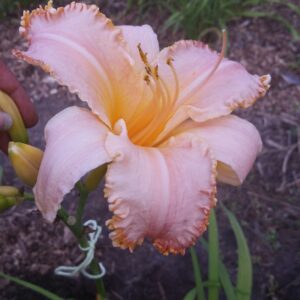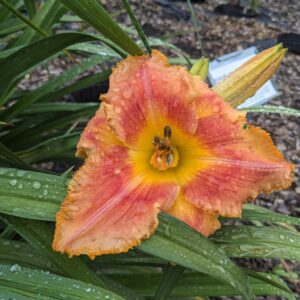Our Plants
Showing 265–272 of 587 results
-
Hemerocallis ‘Hyperion’
Midsummer, fragrant lemon yellow trumpets
Midsummer, fragrant lemon yellow trumpets
Size: 36" x 12"
Care: Sun, moist well-drained soil. Drought tolerant.Hybrid origin, bred in 1925 and still popular today.
-
Hemerocallis ‘Peachy Sunshine’ Z 4-9
Wavy-edged, peachy-pink petals form a 6-pointed star with a yellow throat as sunny as Bob’s disposition. Blooms late mid-season
Wavy-edged, peachy-pink petals form a 6-pointed star with a yellow throat as sunny as Bob’s disposition. Blooms late mid-season
Size: 30-35” tall, flowers 6 1/2” across
Tetraploid hybridized by Robert Koehne in 2013, only a seedling when Bob passed (1971-2014)
-
Hemerocallis ‘Ramble on Rose’ Bob’s daylily Z 4-10
Rosy pink petals with a dainty ruffle and a pale yellow center
OUT OF STOCK
Tetraploid daylily with rosy pink petals with a dainty ruffle and a pale yellow center. Blooms in July.
Robert Koehne (April 1971-September 2014) Bob was a good personal friend and very enthusiastic gardener – perennially cheerful. He loved his wife and two children and daylily breeding. These daylilies are his “children” too. He bred them, named them and registered them. He died of colon cancer too soon – before he could grow grey with Darby or see his kids or his daylilies grow up. We are growing on his daylilies. This year we have only a few to sell but in time these will multiply, hopefully like rabbits. The proceeds go to his family.
Tetraploid daylily with rosy pink petals with a dainty ruffle and a pale yellow center. Blooms in July.
-
Hemerocallis ‘Sunshine Daydream’ Bob’s daylily Z 4-10
Light pink ruffled petals with a bright yellow center.
OUT OF STOCK
Tetraploid daylily with light pink ruffled petals with a bright yellow center. Blooms in July.
Robert Koehne (April 1971-September 2014) Bob was a good personal friend and very enthusiastic gardener – perennially cheerful. He loved his wife and two children and daylily breeding. These daylilies are his “children” too. He bred them, named them and registered them. He died of colon cancer too soon – before he could grow grey with Darby or see his kids or his daylilies grow up. We are growing on his daylilies. This year we have only a few to sell but in time these will multiply, hopefully like rabbits. The proceeds go to his family.
Tetraploid daylily with light pink ruffled petals with a bright yellow center. Blooms in July.
-
Hemerocallis ‘Tomato’ Bob’s Tetraploid Daylily ‘Tomato’ Z 4-9
Self daylily with fat, round petals resembling rich, ripe red polished tomatoes with a hint of sparkle, deepening toward the throat. Mid-season bloom.
Self daylily with fat, round petals resembling rich, ripe red polished tomatoes with a hint of sparkle, deepening toward the throat. Mid-season bloom.
Size: 32-38” tall, flowers 6” across
Wildlife Value: Pollen attracts and feeds bees, some hawkmoths, some butterflies and hummingbirds.Robert Koehne (April 1971-September 2014) Bob was a good personal friend and very enthusiastic gardener – perennially cheerful. He loved his wife and two children and daylily breeding. These daylilies are his “children” too. He bred them, named them and registered them. He died of colon cancer too soon – before he could grow grey with Darby or see his kids or his daylilies grow up. We are growing on his daylilies. This year we have only a few to sell but in time these will multiply, hopefully like rabbits. The proceeds go to his family.
Tetraploid hybridized by Robert Koehne in 2013, only a seedling when Bob passed (1971-2014)
-
Hemerocallis ‘We are Everywhere’ Blooms in July. Bob’s daylily Z 4-10
Ruffled peach petals with deep orange border leading to a golden center with a hint of green
OUT OF STOCK
Tetraploid daylily with ruffled peach petals with deep orange border leading to a golden center with a hint of green. Blooms in July.
Robert Koehne (April 1971-September 2014) Bob was a good personal friend and very enthusiastic gardener – perennially cheerful. He loved his wife and two children and daylily breeding. These daylilies are his “children” too. He bred them, named them and registered them. He died of colon cancer too soon – before he could grow grey with Darby or see his kids or his daylilies grow up. We are growing on his daylilies. This year we have only a few to sell but in time these will multiply, hopefully like rabbits. The proceeds go to his family.
Tetraploid daylily with ruffled peach petals with deep orange border leading to a golden center with a hint of green. Blooms in July.
-
Hemerocallis ‘Baby Cheeks’
Ruffled margins encircle its broad recurve petals, the color of baby’s cheeks setting off a primrose yellow throat.
Tetraploid daylily. Our own hybrid. Flowers in July.
Ruffled margins encircle its broad recurve petals, the color of baby’s cheeks setting off a primrose yellow throat.Size: 20-30” tall
Care: Full sunOur own hybrid
-
Hemerocallis ‘Candy Corn” Z 4-9
Tetraploid Daylily. Broad peach fading to yellow ruffled edges. Sepals shorter than petals, Golden center. Blooms in July.
Tetraploid Daylily. Broad peach fading to yellow ruffled edges. Sepals shorter than petals, Golden center. Blooms in July.
Size: 28-36” tall. Blossom 4.5” across
Care: sun in most any soilTetraploid Daylily. Broad peach fading to yellow ruffled edges. Sepals shorter than petals, Golden center. Blooms in July.

